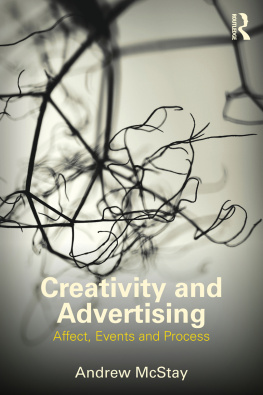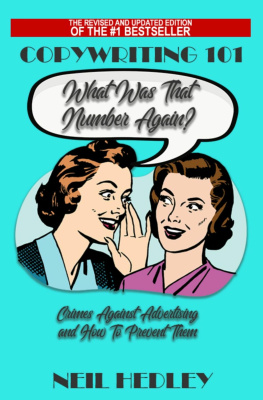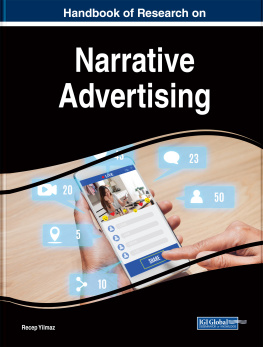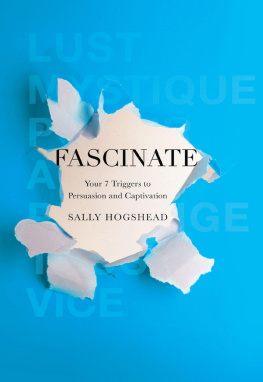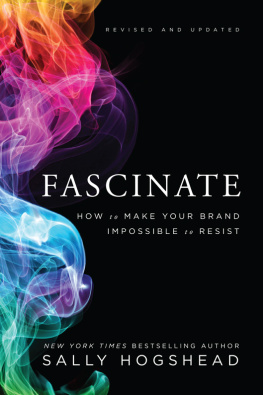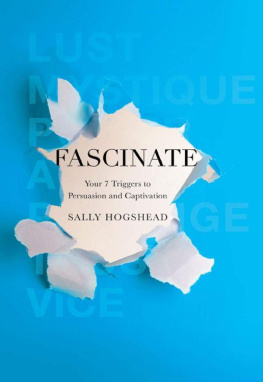Fascinate: Your 7 Triggers to Persuasion and Captivation
HOW THE WORLD SEES YOU. Copyright 2014 by Sally Hogshead. All rights reserved under International and Pan-American Copyright Conventions. By payment of the required fees, you have been granted the nonexclusive, nontransferable right to access and read the text of this e-book on-screen. No part of this text may be reproduced, transmitted, downloaded, decompiled, reverse-engineered, or stored in or introduced into any information storage and retrieval system, in any form or by any means, whether electronic or mechanical, now known or hereinafter invented, without the express written permission of HarperCollins e-books.
FIRST EDITION
Interior graphics created by Emily Johnson
ISBN 978-0-06-223069-0
EPub Edition July 2014 ISBN 9780062230706
14 15 16 17 18 OV/RRD 10 9 8 7 6 5 4 3 2 1
TO MY MOTHER AND FATHER, WHO TAUGHT ME HOW TO BECOME MORE OF WHO I ALREADY AM.
CONTENTS
I stood alone onstage, paralyzed. Seconds ticked by, each more excruciating than the last. The spotlight had seemed so luminous a moment before, but now it burned me with its bitter circle. Id let everyone down.
It was in this moment that I learned how to be boring.
FRANKLY, I HADNT really expected to perform in that dance recital. The year before, my older sister Nancy was anointed fastest swimmer in her event by the Guinness Book of World Records, and my older brother Andy was accepted into Harvard. I couldnt outswim my sister or outthink my brother. How could I stand out, and make my parents proud?
Dance, I decided, would allow me to define myself away from the overcrowded family trophy mantel of sports and Ivy League schools. So I took dance lessons and learned pirouettes and jazz hands, grapevines and old classic tap maneuvers like the Shuffle Off to Buffalo.
I wasnt a great technical dancer, by any means. The other girls in my class were more skilled, more talented, and more classically beautiful. That said, I doubt any of them had as much fun as I did in class. My dance teacher, Miss Mervyn, apparently agreed. Sally, youre not a great dancer, she once commented, but you do have a certain spark.
I beamed. A spark? I can work with that. Hand me the kerosene.
That year, she gave me a solo in the dance recital. This was in part an honor, and, I suspect, also a way to fund the performance since it required dozens of individual lessons and a hand-sewn costume. I was ecstatic. Finally, Id get to be good at something.
We rehearsed for several hours a week, my mom driving me to the studio after Brownies and before dinner. At the dinner table, I would look around and just glow. Nancy had swim practice, Andy had school, and now at last I too had my place among them. I would make the family proud. I pointed my toes and practiced my steps under the dinner table.
I spent every moment mentally rehearsing in order to get the steps just right. The steps, however, felt painstakingly intricate. Secretly, I would have preferred a simpler routine so I could enjoy the dancing instead of counting out the choreography. But since none of the other girls struggled with their dances, I didnt want to disappoint Miss Mervyn.
At last came opening night. My costume was finished: a confection of itchy and highly flammable nylon bedazzled with sequins, held up by too-tight elastic straps.
It was the most beautiful thing Id ever seen.
I stood backstage, watching my teacher intently, awaiting my cue. My music began. I was ready. As I was about to prance onstage, Miss Mervyn whispered into my ear.
Just dont forget the steps.
Well, you can probably guess what happened next. My mind went blank. Those carefully engineered steps fled from my brain like rats abandoning a sinking ship. I froze with panic. The music stopped awkwardly mid-note. The audience was silent. The spotlight turned off with a loud clank, echoing through the auditorium.
I glanced backstage to find Miss Mervyn. She looked horrified. It was the first time Id ever worn mascara, and a black teardrop cascade began.
I never took another dance lesson.
Ever.
YOU ARE ALREADY FASCINATING
On the day you were born, you already knew how to fascinate. Like breathing and swallowing and smiling, the ability to fascinate is a hardwired survival mechanism. Fascination is an instinctive form of connection. We all have this ability in some form.
But over time, people can lose their innate ability to fascinate. They acquire layers of boring. Like an oyster protecting itself against the grain of sand, people build shells that they believe can shield them from a negative outcome. Youve seen this before, or perhaps experienced it. Its the student who learns how to camouflage himself to blend into the popular high school crowd. The employee who waters down his ideas in order to shield himself from criticism. The new entrepreneur who tries to run her business just like everyone else, and ends up with a me-too product. In any pressured environment, it can be easier to stay in the background. Unnoticed seems easier than unworthy.
Hiding works for a while. But it always backfires. You will never be your most successful when evaluated according to criteria that do not allow you to stand out.
Theres a certain puritanical goodness to avoiding attention. Its almost a moral cleanliness, like organized closets and modest hemlines. Its beyond reproach, in a nobody gets fired for buying IBM sort of way. Across geographic borders and cultural boundaries, attention attracts danger while anonymity can be seen as a virtue.
When the stakes rise, so does perceived danger. Just as chameleons rush to hide by changing colors to match their surroundings, people tend to want to hide.
In a sense, most of us were schooled to avoid being too fascinating. As kindergartners were taught to stand in line for class. Color within the lines. Raise a hand. Wait your turn. Standing out is labeled as misbehaving.
The problem is, the real world isnt like that. At least, not anymore. In todays worldthe one with distracted clients, bigger competitors, and people who are willing to work for less than youthe old model is deeply flawed. You will not win by being invisible. Today, you win by being seen and remembered.
Ive never met anyone who doesnt have a few insecurities about how theyre perceived by others. Why do we care so much about what others think of us? An easy answer would be to say its fear of looking bad in front of others, or making a fool of ourselves. Yet, I believe the real answer goes deeper than that.
Most people are afraid they have nothing special to give. They think theres nothing distinctly valuable that they can offer. Most people dont want to ask for attention, because theyre afraid nobody cares. Even when people do want to rise above the fray, they are terrified by the prospect of what to do with attention once theyve successfully earned it.
Your most fascinating traits are your most valuable traits. Too often, these traits are the first to go in favor of blending in or avoiding criticism. Yet when you dull your edges, on some level youre giving up.
I gave up dance. What did you give up?
DID YOU GIVE UP YOUR ABILITY TO FASCINATE?
The Study of Fascination is the first in-depth national marketing study about why we become fascinated by certain types of communication, how fascination drives the workplace, and how much fascination is actually worth. It was developed and executed specifically for my company, How To Fascinate. It was conducted by Kelton Global, one of the worlds top global marketing research firms. This initial research includes more than one thousand people around the United States, in a wide range of ages, industries, and professional levels. Our survey measured what types of communication are most likely to fascinate people, and which types of marketing, news, conversations, and media are most likely to engage others. We measured their level of engagement in the workplace (only 8% of employees think their boss is extremely fascinating) and in their lives (96% of parents think their children are fascinating).



